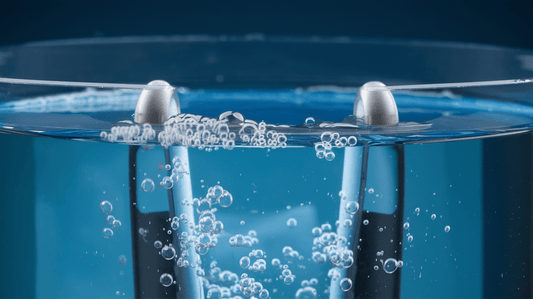Hydrogen Tablets Vs Hydrogen Water Generators: Understanding Dissolution, Quasi-Dissolution, and Measuring Hydrogen Concentrations
UpdatedOur Commitment to Accuracy and Objectivity
Ocemida is committed to delivering reliable and unbiased information. Our editorial team, comprised of experienced editors and medical experts, meticulously reviews every article and guide to ensure the content is accurate, up-to-date, and free from bias.
Rigorous Fact-Checking Process
To uphold the highest standards of accuracy, we adhere to the following fact-checking guidelines:
Trusted Sources: We only cite reputable sources, such as peer-reviewed journals, government reports, academic and medical associations, and interviews with credentialed healthcare professionals.
Evidence-Based: All claims and data are supported by at least one credible source. Each article includes a comprehensive bibliography with full citations and links to the original sources.
Internal Linking: While we may include internal links to other relevant Ocemida pages for better navigation, these links are never used as primary sources for scientific information.
Expert Review: A member of our medical or scientific expert team provides a final review of the content and cited sources for all articles and product reviews related to medical and health topics.
By following these rigorous standards, Ocemida strives to provide readers with reliable and informative content.
Share with a friend
The world of drinking water has seen an evolution in recent years, with the introduction of hydrogen water. This water type, enriched with dissolved hydrogen gas (H2), promises potential health benefits, including antioxidative and anti-inflammatory properties. The processes by which the hydrogen gas is introduced into the water can significantly impact its overall quality and effectiveness. In this extended article, we will delve into two key methods – dissolution and quasi-dissolution, explore the ways to measure dissolved gas concentrations, and discuss some of the challenges associated with hydrogen tablets.
True Gas Dissolution vs Quasi-Dissolution
True gas dissolution in water follows Henry's Law, stating that "at a constant temperature, the amount of a given gas dissolved in a given type and volume of liquid is directly proportional to the partial pressure of that gas in equilibrium with the liquid." For hydrogen water, true dissolution ensures a uniform distribution of hydrogen molecules within the water, allowing them to reach locations in the human body that larger antioxidant molecules may not access.
Contrastingly, quasi-dissolution implies a non-uniform distribution of hydrogen gas. In this case, the gas is confined in micro or nano bubbles within the water. Hydrogen water produced by magnesium hydrogen tablets often follows the quasi-dissolution process. While manufacturers might claim hydrogen levels of 8-12 ppm (parts per million), these numbers reflect quasi-dissolution rather than true dissolution.
Under normal atmospheric pressure, the maximum dissolution of hydrogen in water is 1.6 ppm. This limit remains constant regardless of how much gas you bubble through the water. Water with quasi-dissolved hydrogen may exhibit a high initial concentration of hydrogen gas, but this concentration quickly diminishes once exposed to air as the gas escapes from the suspended bubbles.
Measuring Hydrogen Concentrations: Blue Drops and H2 Meters
The measurement of dissolved gas concentrations is paramount in determining the quality and effectiveness of hydrogen water. Two primary methods for measuring hydrogen concentrations in water are the use of blue drops reagent and H2 meters.
The blue drops use an oxidimetry method, often referred to as titration, involving a methylene blue-platinum colloid reagent. The cost-effectiveness of this method, approximately $30, makes it a popular choice among many individuals. However, this method has a fundamental limitation – the reagent reacts with undissolved micro bubbles (quasi-dissolution), giving a false impression of high concentrations.

H2 meters, on the other hand, provide a more accurate reading of dissolved hydrogen concentration. The industry-standard Trustlex 2000, despite being pricier at about $800, is trusted for its reliability. While there are cheaper alternatives, they often prove to be unreliable.
Given the discrepancies, it's important to be informed that achieving therapeutic levels above 1.6PPM of dissolved hydrogen is possible only by pressurizing the gas in a container.
Challenges with Hydrogen Tablets
The use of hydrogen tablets as a source of hydrogen water is associated with several challenges.
-
Taste: Many individuals find the taste of the hydrogen water produced from these tablets unpleasant, making it difficult to incorporate them into daily use.
An often-overlooked issue related to magnesium hydrogen tablets is their potential impact on pets. When dissolved in water, these tablets produce hydrogen-enriched water that, while potentially beneficial for humans, is not suitable for pet consumption.
The magnesium residue and the unfamiliar chemical composition can pose health risks to animals, particularly smaller pets, with a system more sensitive than humans.
Hence, pet owners need to ensure that water enriched with magnesium hydrogen tablets is not accessible to their pets.
Given this limitation and other challenges, many are turning to hydrogen water generators.
These devices offer a more economical and versatile solution, generating pure hydrogen water without the downsides associated with magnesium tablets. Not only do they ensure the safety and health of human consumers, but they also protect our furry friends from potential harm.
- Cost: Hydrogen tablets are expensive. With two tablets per day, with the most cost effective brand, the annual cost amounts to approximately $400, making it a pricy option for daily consumption.
| Daily Intake | Monthly Cost | Annual Cost |
|---|---|---|
| 1 tablet | $16.67 | $200 |
| 2 tablets | $33.33 | $400 |
| 3 tablets | $50 | $600 |
- Health implications: Some people report adverse side effects such as diarrhea or stomach problems from the tablets.
- Drug interactions: Individuals on medication need to be cautious as the magnesium in these tablets can interact with certain drugs.
- Limited intake: The quantity of tablets one can safely consume per day limits the amount of hydrogen water intake, potentially restricting the health benefits.
Conclusion
The understanding of dissolution and quasi-dissolution in hydrogen water is critical, impacting the potential health benefits it can provide. While both methods result in hydrogen-enriched water, true dissolution offers a consistent level of hydrogen and superior potential benefits.
Accurately measuring dissolved hydrogen concentrations is also vital to assess the quality of hydrogen water. Although the blue drops method provides a cost-effective way to measure dissolved hydrogen, it's less accurate compared to H2 meters.
Finally, while hydrogen tablets may seem a convenient way to consume hydrogen water, they come with various challenges, including taste, cost, potential health implications, and limitations on intake. This information is vital to ensure informed choices about hydrogen water consumption.
Table of Contents












































